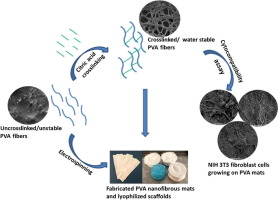当前位置:
X-MOL 学术
›
Eur. Polym. J.
›
论文详情
Our official English website, www.x-mol.net, welcomes your feedback! (Note: you will need to create a separate account there.)
Crosslinking Electrospun Poly (vinyl) Alcohol Fibers with Citric Acid to Impart Aqueous Stability for Medical Applications
European Polymer Journal ( IF 6 ) Pub Date : 2020-02-01 , DOI: 10.1016/j.eurpolymj.2020.109484 Divya Nataraj , Roopa Reddy , Narendra Reddy
European Polymer Journal ( IF 6 ) Pub Date : 2020-02-01 , DOI: 10.1016/j.eurpolymj.2020.109484 Divya Nataraj , Roopa Reddy , Narendra Reddy

|
Abstract In this study, the highly hydrophilic PVA was made into water-stable electrospun fibers using citric acid (CA) as a green crosslinker. Although PVA is accepted as a biocompatible polymer, poor water resistance especially when made into nano and microfibers limits its biomedical applications. Previous attempts to improve the stability and mechanical properties of electrospun PVA have either used toxic crosslinkers or expensive and tedious chemical modifications. In this research, we have developed electrospun PVA fibers and later crosslinked the fibers using citric acid. The electrospun fibers were studied for their water stability, tensile strength, elongation, morphology, thermal stability, and biocompatibility. The uncrosslinked fibers had an average diameter of 100–300 nm but disintegrated in water immediately. The crosslinked nanofibers were found to be stable in water after immersion in water even after 72 h. However, the nanoscale morphology of the fibers was not retained. The maximum strength of 7.6 MPa and elongation of 55.28% was obtained when the electrospun membranes were crosslinked with 10% CA. In addition to improved water resistance, crosslinking increased the thermal stability of the fibers with the melting temperature increasing to 194 °C from 170 °C. Also, crosslinked PVA nanofibers were stable in cell culture media for up to 96 h and supported the attachment and proliferation of NIH 3 T3 mouse fibroblast cells in time dependent manner. This study demonstrates a means to obtain PVA nanofibers and also freeze-dried scaffolds with aqueous stability and biocompatibility required for tissue engineering and other medical applications.
中文翻译:

用柠檬酸交联电纺聚(乙烯)醇纤维以赋予医疗应用的水性稳定性
摘要 在这项研究中,使用柠檬酸 (CA) 作为绿色交联剂,将高度亲水的 PVA 制成水稳定的电纺纤维。尽管 PVA 被认为是一种生物相容性聚合物,但耐水性差,尤其是制成纳米和超细纤维时,限制了其生物医学应用。以前尝试提高静电纺 PVA 的稳定性和机械性能,要么使用有毒交联剂,要么使用昂贵且繁琐的化学改性。在这项研究中,我们开发了电纺 PVA 纤维,然后使用柠檬酸使纤维交联。研究了电纺纤维的水稳定性、拉伸强度、伸长率、形态、热稳定性和生物相容性。未交联的纤维平均直径为 100-300 nm,但在水中立即分解。发现即使在浸入水中 72 小时后,交联的纳米纤维在水中仍是稳定的。然而,没有保留纤维的纳米级形态。当电纺膜与 10% CA 交联时,获得了 7.6 MPa 的最大强度和 55.28% 的伸长率。除了提高耐水性外,交联还提高了纤维的热稳定性,熔融温度从 170°C 增加到 194°C。此外,交联的 PVA 纳米纤维在细胞培养基中稳定长达 96 小时,并以时间依赖性方式支持 NIH 3 T3 小鼠成纤维细胞的附着和增殖。该研究展示了一种获得 PVA 纳米纤维以及具有组织工程和其他医学应用所需的水稳定性和生物相容性的冻干支架的方法。
更新日期:2020-02-01
中文翻译:

用柠檬酸交联电纺聚(乙烯)醇纤维以赋予医疗应用的水性稳定性
摘要 在这项研究中,使用柠檬酸 (CA) 作为绿色交联剂,将高度亲水的 PVA 制成水稳定的电纺纤维。尽管 PVA 被认为是一种生物相容性聚合物,但耐水性差,尤其是制成纳米和超细纤维时,限制了其生物医学应用。以前尝试提高静电纺 PVA 的稳定性和机械性能,要么使用有毒交联剂,要么使用昂贵且繁琐的化学改性。在这项研究中,我们开发了电纺 PVA 纤维,然后使用柠檬酸使纤维交联。研究了电纺纤维的水稳定性、拉伸强度、伸长率、形态、热稳定性和生物相容性。未交联的纤维平均直径为 100-300 nm,但在水中立即分解。发现即使在浸入水中 72 小时后,交联的纳米纤维在水中仍是稳定的。然而,没有保留纤维的纳米级形态。当电纺膜与 10% CA 交联时,获得了 7.6 MPa 的最大强度和 55.28% 的伸长率。除了提高耐水性外,交联还提高了纤维的热稳定性,熔融温度从 170°C 增加到 194°C。此外,交联的 PVA 纳米纤维在细胞培养基中稳定长达 96 小时,并以时间依赖性方式支持 NIH 3 T3 小鼠成纤维细胞的附着和增殖。该研究展示了一种获得 PVA 纳米纤维以及具有组织工程和其他医学应用所需的水稳定性和生物相容性的冻干支架的方法。

























 京公网安备 11010802027423号
京公网安备 11010802027423号